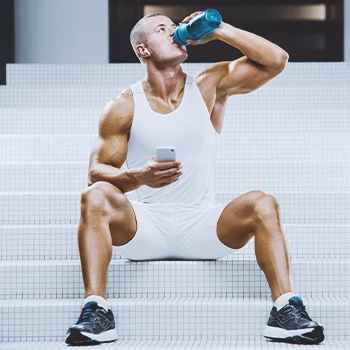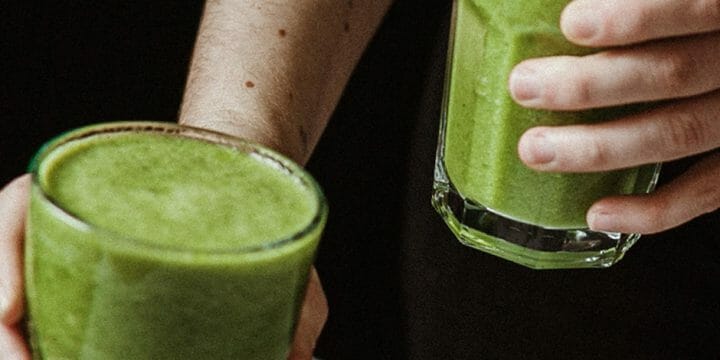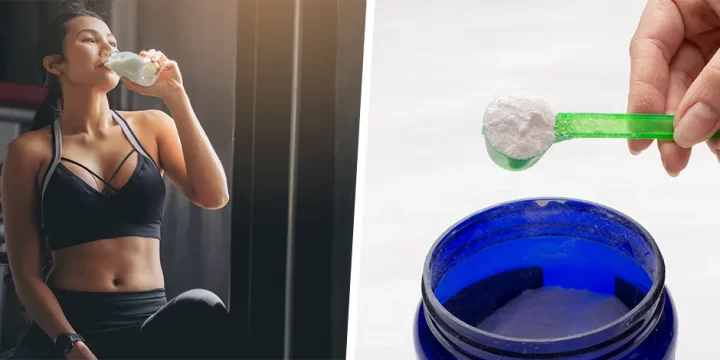As a former national soccer player and MMA champion, I've been asked countless times whether protein powders can serve the same purpose as pre-workouts.
Through my athletic and coaching careers, I've learned that they serve distinct roles.
So I decided to prepare this report, drawing from my personal journey and professional experience.
I also did additional research and consulted a dietitian to tighten the article properly.
Here are my findings.
Quick Summary
- Pre-workouts enhance training intensity and focus, while protein powders aid muscle recovery and growth.
- Protein shakes can be consumed at any time and have been shown to increase muscle mass post-exercise.
- Approximately 60% of high school athletes use protein supplements, indicating their widespread acceptance for enhancing performance.
- Combining pre-workouts with protein supplements has personally revolutionized my training, providing the focus and nutritional support needed for peak performance.
What Do A Pre-workout and Protein Powder Have in Common?

Protein powders and pre-workout supplements have two things in common: they both come in powdered form and are both used to complement diet and exercise.
They should not be used as substitutes for a balanced diet but as boosters to an already established training regimen and diet restriction.
And that's pretty much it as far as their similarities are concerned.
According to a study published in the Global Pediatric Health journal, approximately 60% of high school football athletes consume protein supplements for muscle recovery and growth, while nearly 30% also use pre-workout supplements, showcasing a trend of widespread supplement usage among younger athletes [1].
Before we examine what makes them different, let's examine their roles.
The Purpose of Protein Powders

It's hard to find a serious gymgoer who doesn't use whey protein or protein powders in general. Protein shakes and powders are easily the most popular bodybuilding supplements in the health and fitness industry.
Now, to understand what protein powder does, it's essential to understand its purpose.
The work of a protein shake or powder is to fuel muscle recovery, maintain a healthy metabolism, and promote muscle gain.
One study, published in the American Journal of Clinical Nutrition, which examined the effects on 40 men, found that increased protein intake through supplementation was associated with increased muscle mass, particularly after engaging in strength training and cardio [2].
From my days on the soccer field to the kickboxing ring, whey protein has been a staple in my diet. It's not just about increasing protein intake; it's about fueling muscle mass and recovery, something I've relied on throughout my athletic career.
Bodybuilders and athletes love whey protein shakes because they come loaded with essential amino acids, stimulants, minerals, and vitamins that are useful in burning fat cells in the body [3].
Below are the full benefits of protein powders and shakes:
- Weight management because of their low calorie-to-protein ratio
- Promotes satiety
- Enhance muscle tone and maintains muscle mass
- Boosts recovery after a workout
- It can be used as a vegan-friendly alternative to dairy and meat
There's no specific best time to take protein powder, but the common practice among bodybuilders is to drink it after the workout.
The Purpose of a Pre-workout

When there’s no energy or passion for working out, pre-workouts come in handy to help you stay motivated and focused on your fitness goal.
Put simply, pre-workouts boost performance by allowing you to train harder and for longer.
That includes enabling you to have more energy, a sharp focus, and the power to push you further.
Pre-workouts also boost endurance and contain nutrients such as amino acids that boost muscle blood flow [4]. I remember the first time I took a pre-workout before a training session; the surge in endurance was unmistakable.
“The point of pre-workout is to boost your focus and energy and help you achieve maximum performance in the gym or during your chosen exercise.”
- Charlie Meister, Online Personal Trainer
As you can already guess, pre-workouts contain stimulants like caffeine that push you towards maximum input for optimal results. Other ingredients include creatine, taurine, essential amino acids, and beta-alanine [5].
Moreover, certain ingredients in pre-workouts, notably caffeine, creatine, and beta-alanine, have been recognized for their cognitive-enhancing properties, positioning some pre-workout blends in the realm of nootropics as well.
Additionally, cutting-edge components like genistein and ligustrazine phosphate are proving to be revolutionary, providing a range of unique advantages that support both mental and physical aspects of fitness.
The best time to take a pre-workout is around half an hour before a workout so that the blend of ingredients can find time to kick in as you train [6].
The Differences

Pre-workouts and protein powders have several differences, some of which we’ve already mentioned.
Purpose
A pre-workout enhances performance and training intensity during a workout, while a protein shake is meant to aid muscle recuperation.
Time Taken
A pre-workout is taken around 30 minutes before a workout, while protein shakes can be taken anytime, including before and after training.
Nutrient and Calorie Difference
In addition, both pre-workouts and protein shakes have a nutrient and calorie difference.
Protein powders often have more calories because they are distilled food sources, while pre-workouts usually contain micronutrients and synthetic ingredients to boost performance.
FAQs
Is Protein Powder Better Pre or Post-Workout?
Protein powder is better post-workout. However, it’s still beneficial to drink a protein shake both before and after a workout in terms of muscle repair and growth.
Do You Need Pre-workout and Protein Powder?
Yes, you need a pre-workout supplement to maximize your training performance and a protein powder to boost your recovery.
Can I Take Pre-workout and Protein Powder Simultaneously?
Yes, you can take protein powder and pre-workout supplements simultaneously. There are no side effects.
Which Is Best for Beginners?
For beginners, starting with a pre-workout supplement can enhance motivation and performance, providing the necessary drive to persist with new exercise routines. However, it's crucial to start with lower doses and seek medical advice before making any changes.
What Is the Best Time to Take Pre-workouts and Protein Shakes?
The best time to consume a pre-workout is 15–45 minutes before exercise, and protein shakes are effective when taken either before or after a workout, with recent research indicating the anabolic window for muscle recovery extends beyond 30 minutes [7].
References:
- https://www.ncbi.nlm.nih.gov/pmc/articles/PMC8273399/
- https://pubmed.ncbi.nlm.nih.gov/26817506/
- https://www.ncbi.nlm.nih.gov/pmc/articles/PMC2901380/
- https://www.ncbi.nlm.nih.gov/pmc/articles/PMC2854104/
- https://www.ncbi.nlm.nih.gov/pmc/articles/PMC6413194/
- https://www.ncbi.nlm.nih.gov/pmc/articles/PMC5445139/
- https://www.ncbi.nlm.nih.gov/pmc/articles/PMC7400240/
About The Author
You May Also Like






